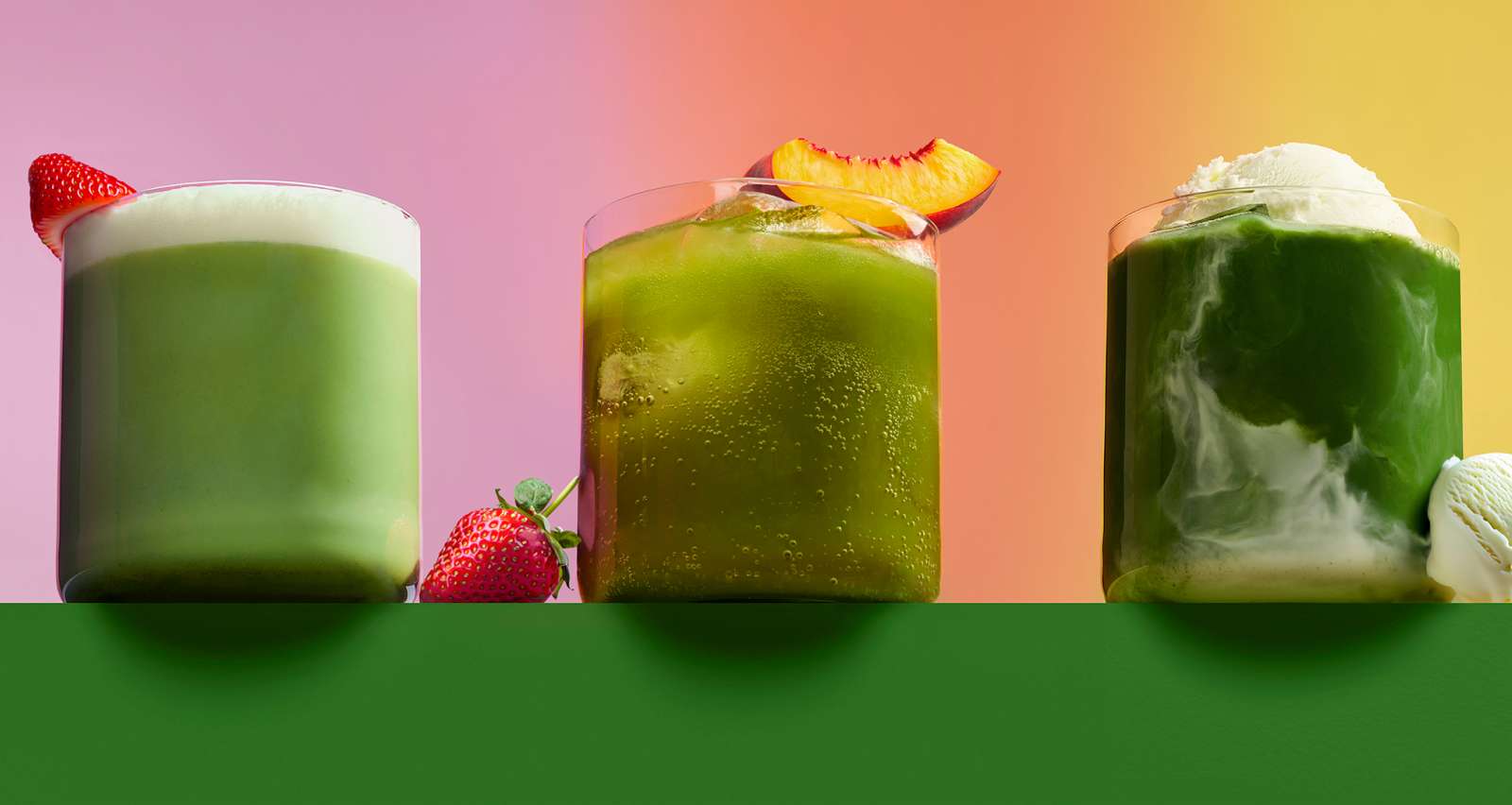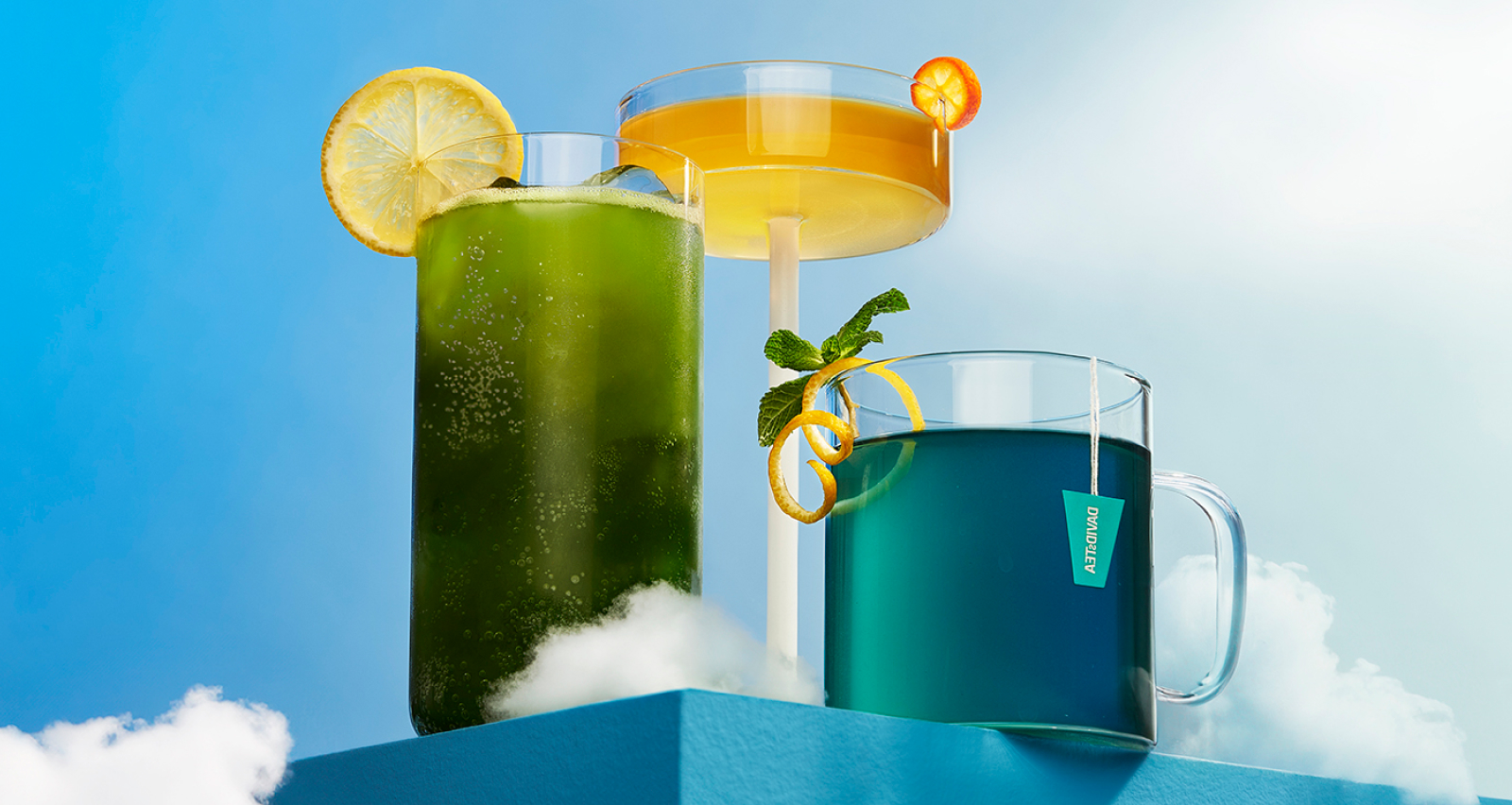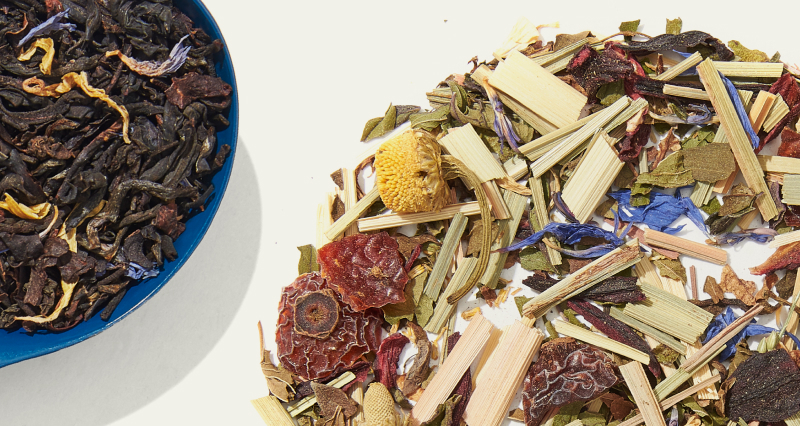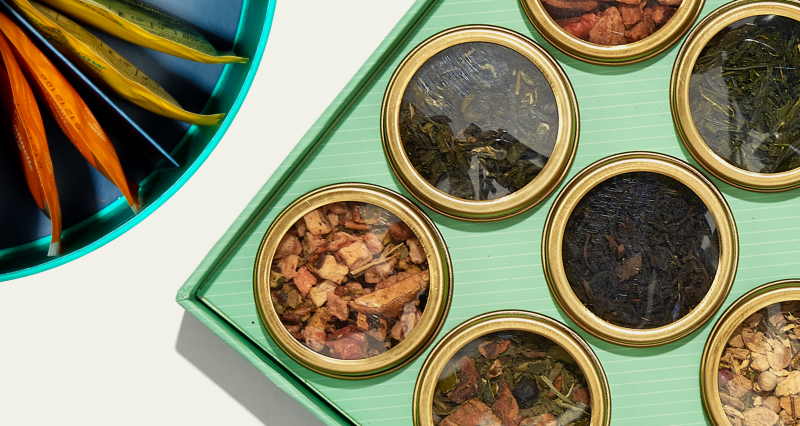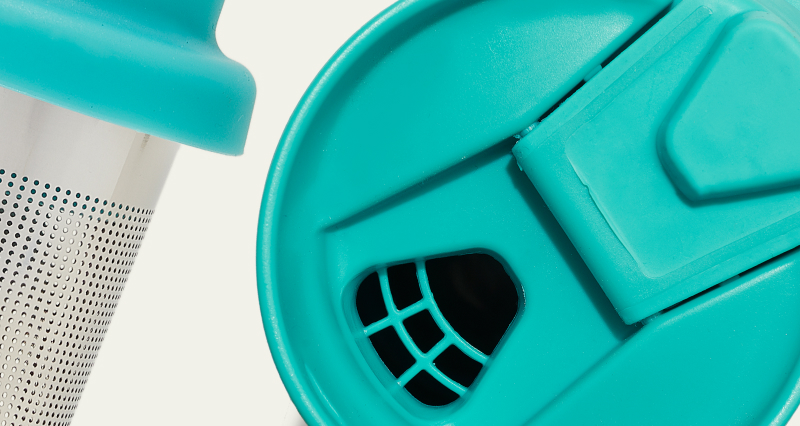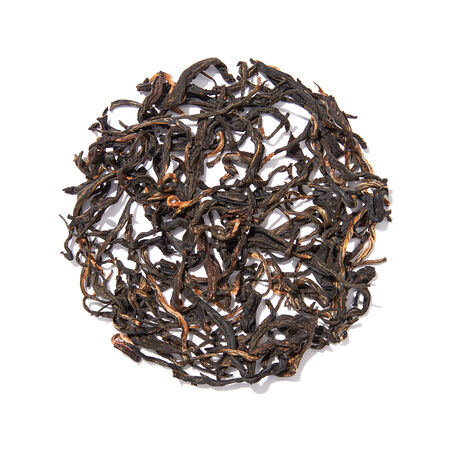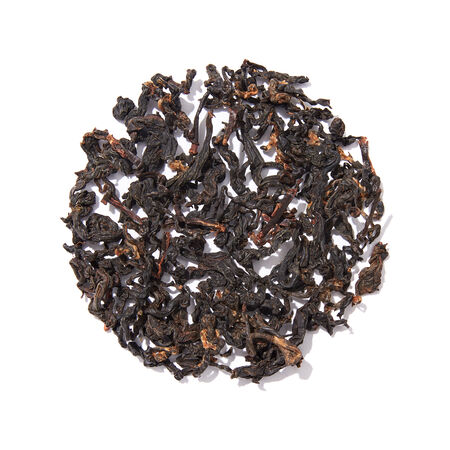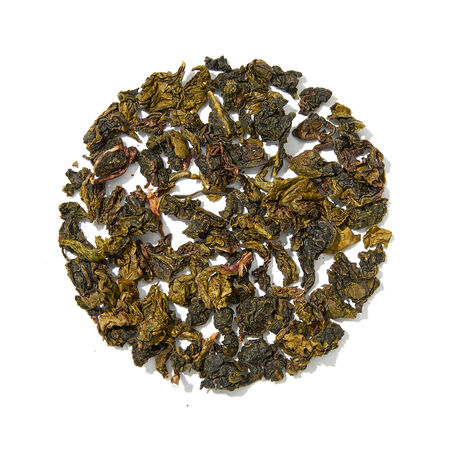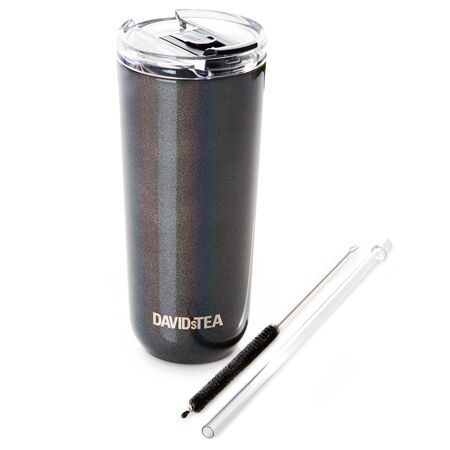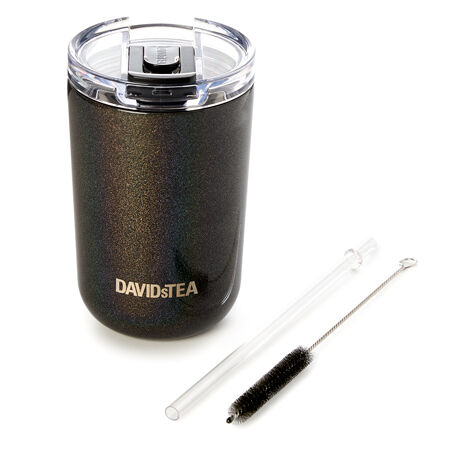episode 7
What makes
Nepalese tea
so good?
with Peru Gyawali

steeping together
podcast - episode #07
What makes Nepalese tea so good?
with Peru Gyawali
episode transcript
Marika de Vienne 0:18
Welcome everyone to another episode of Steeping Together, the podcast where we explore the vast world of tea over a cup of tea with tea enthusiasts. I'm your tea-obsessed host Marika, and as usual, I am so excited to be with you all today. So when most people think of tea origins, countries like China, Japan and India are generally the first to come to mind. Many people also associate finer teas with a specific region of India known as Darjeeling. This collective of gardens produce what has widely become known as the champagne of tea, and all flushes or crops of this tea are highly prized in tea salons, shops and restaurants around the world. But what if the production of teas that are made in neighbouring Nepal, bordering India and Tibet, China, this country – never colonised – produces a tea that is so similar to those of Darjeeling that for many years, unscrupulous tea traders would sell Nepalese tea under the name of Darjeeling, and would almost never get caught. Known for its high altitude, fresh air and perfect climate for producing tea. It is unfortunate that more people don't know about the fantastic teas coming out of this region. So in order to rectify the situation, and to learn more about the area, I have invited Peru Gyawali to shed some light on one of the world's most fascinating terroirs. Welcome, Peru.
Peru Gyawali 1:45
Thank you, Marika.
Marika de Vienne 1:47
Peru, did I say your last name correctly?
Peru Gyawali 1:49
It's pronounced as G-ya-wali.
Marika de Vienne 1:51
Gyawali. And I feel like you've told me this several times, but for some reason, my brain…!
Peru Gyawali 1:58
It’s alright. We can forgive people about like, you know, not being able to pronounce certain names. That's totally understandable.
Marika de Vienne 2:05
You’re a most generous guests and I'm very appreciative of your forgiveness towards me. So Peru, would you like to introduce yourself the way you'd like to be introduced?
Peru Gyawali 2:15
Hi, my name is Peru Gyawali. I am from Nepal. I worked in Nepali tea garden for three years. But I have been indirectly involved for many, many years. So I'm hoping with my knowledge, experience and understanding, we are able to tell our listeners about Nepal tea, and hopefully by the end of it, they are encouraged to go try more Nepali teas.
Marika de Vienne 2:43
I hope so as well, because I've had a few teas from Nepal. I've had Nepal Black, I've had many teas from Jun Chiabari, and I'm always astounded at the finesse, the balance, the flavour. It's one of those regions that when I drink the tea, I feel like I'm treating myself, like I'm treating myself to something really nice. Like I deserve this moment, I deserve this flavour. It's just really – I hate to use the word refined, I find the word refined to be like elitist and off-putting – but it does have such a nice clarity. The teas of Nepal have such a beautiful clarity and balance that I just I feel like a queen drinking them. I really do! So talk to me about Nepal. I've never been, I've been to China, I've been to India, I've been to the two countries neighbouring Nepal. But I've never ever been to Nepal. What can you tell me about it?
Peru Gyawali 3:45
Nepal as a country or just in the industry?
Marika de Vienne 3:49
Whatever comes to mind. I mean, you're born there, you grew up there. You've been in Montreal for…
Peru: A year.
Marika: A year! Okay, so you really, you know, have spent most of your life in Nepal, when I ask you – it's a very broad question, it can mean a great many things. But when I asked you tell me about Nepal, what's the first thing that comes to mind?
Peru Gyawali 4:10
Okay, the first thing that comes to mind is, when you say Nepal, immediately it's home for me. It’s home because my family they still live there. I'm all alone over here, so.
Marika de Vienne 4:21
You're not alone. You got us. You got me, girl! But I understand what you mean.
Peru Gyawali 4:27
It's home. But just to give you a basic like gist of Nepal. It's, like you said it's a country sandwiched between Tibet, China and India. It's a landlocked country. But we are very well known for our mountains. Very well known for like tourism, hiking. And I think over the years we've been, we've been slowly getting known for our teas also. Which is very interesting. It's been a very slow progress of tea growth in Nepal. So, yeah.
Marika de Vienne 5:03
That's beautiful. I mean, it's true that when I think of Nepal, I think of all the things I don't like to do – hiking, climbing. Haha! Yeah, I see mountains. I see large, huge mountains when I think of Nepal. And that's also what I think of when I think of Darjeeling. You know, it's also what I think of, you know, that area of India, just India very high altitude tea-producing region. So let's talk about Darjeeling teas versus Nepalese teas because it's essentially the same climate, it's more or less the same altitude, right?
Peru Gyawali 5:44
Okay. Before going into like Darjeeling, like you know, similarities and differences between Nepali and Darjeeling teas. I think what people must be aware that the Nepali tea industry is dominated by like small tea farmers. Okay?
Marika: Ahh! Okay.
Peru: So if you have to look at like the government stats or something, it's like 60% tea farmers, and 40%, you know, organise tea sector.
Marika de Vienne 6:14
So there's a higher, there's a large proportion of independent tea growers.
Peru Gyawali 6:20
Yes. And they're producing like, quantum leaf I'm talking, they're producing more leaves than this organised tea sector.
Marika de Vienne 6:29
Okay so when we're talking about this organised tea sector, we're talking about more or less mass production.
Peru Gyawali 6:34
Not mass production, it's more like when I talk about organised sector, it means businesses registered with the Department of Industry with the intention of only doing tea business.
Marika de Vienne 6:48
Okay, so they're official, they’re official card-carrying tea producers.
Peru Gyawali 6:52
Yes, whereas the small farmers, they have inherited their ancestral land, and they're growing like tea leaves, they can be doing subsistence farming alongside. They may have organised themselves into cooperatives, they can produce the if they want in the cooperative, or they can sell the green leaf to bigger factories. There's like multiple things happening in the Nepalese tea industry. It's just not like, “Oh, if you're a small farmer, you are growing tea, you know, you can sell or you can make.”
Marika de Vienne 7:25
That's wonderful. That's really interesting to me, because it – and correct me if I'm wrong, but that kind of sounds like the wild west of tea, you know, people really have the independence to create and produce and dictate the product that they're making. Can they also like, they can dictate the price as well at that point, right? They have more control over the product than simply creating something to be mass consumed.
Peru Gyawali 7:51
Yeah, no, that's very true. So that's why like we see in the Nepali tea industry, there's a lot of experimentation going on by like small farmers. Obviously, the process of making tea, you have to follow, if you as a buyer, go to like the small farm and say that, “Hey, I saw this production style in Taiwan, why don't you try this?” They will try it.
Marika: Oh my.
Peru: So you can make – you know, the teas can become exquisite. Or it can be like rubbish at times. Yeah, so like, sometimes these farmers are making like, you know, the tightly balled tea?
Marika de Vienne 8:27
Yeah, tightly rolled, tightly balled and rolled. Yeah.
Peru Gyawali 8:31
Or sometimes it's more stringy, that we associate with like, you know, with Nepalese tea, like, very stringy.
Marika de Vienne 8:37
Very long and flat, yeah.
Peru Gyawali 8:40
So there's a lot of experimentation going in the region, and you don't know what will come out, how it will come out, so.
Marika de Vienne 8:48
That is so exciting. I'm sorry, I'm just – now I need to go to Nepal like tomorrow, you understand that I don't even care about the travel restrictions. I am going to Nepal! Because, wow. Yeah, I think, I think in a lot of countries, there's a tendency to continue producing what has always been produced.
Peru Gyawali 9:07
Yeah. And so that's like, a unique fact about Nepal is like we've developed in our own way, you know? Even the big gardens is very small in comparison to the gardens that you find in the rest of South Asia. And there are no big businesses owning like multiple gardens under one banner.
Marika: Right.
Peru Gyawali 9:32
So it's all either small farmers, or like, you know, small gardens doing their own thing. So it's very unique and you won't find this… What I can summarise by saying is like, the Nepal tea industry is almost a hybrid of China, Japan, Darjeeling, Sri Lanka model. And by this what I mean is, there are many farmers and farmer cooperatives and organized tea gardens that run as companies, which is very unique. And this does not allow us to be burdened by like, one type of tea culture.
Marika de Vienne 10:10
Oh my god that is fascinating! And genuinely something that I didn't ever take into consideration. So the experimentation is huge. There's a, there's a, what you're describing to me sounds like a kind of fearlessness in terms of wanting to try new things.
Peru Gyawali 10:29
Yes, that is true. That is very true.
Marika de Vienne 10:32
Oh well I love that. I absolutely, I absolutely love that. Because as much as tradition is something that I believe personally should be respected, and I love tasting a tea that has been made in the same region with the same tools and the same traditions, as it has been for you know, 200 years, 400 years, you know, pick a tea-picker region, you can find teas that have been made in the exact same way over, you know, centuries. It is really wonderful to find that there's a terroir out there, where the innovation is not about necessarily flavouring the tea or changing the tea, but absolutely importing different production methods within that terroir to create something entirely novel and new.
Peru Gyawali 11:23
Yeah, it's more like trying to see what works for you.
Marika de Vienne 11:28
Oh my God I need to go to Nepal! Okay! So I feel it just I feel like I don't even need to ask you questions. I feel like you just, you're such a wealth of information, because this is your home. This is where you worked in the tea industry. You know a lot about it, and I want to kind of go back to my first question, which was, tell me about Darjeeling versus Nepal? Because that seems like the great debate, you know, like, which is better. Which is a ridiculous question, because the best tea is the one you like, as we all know, it has nothing to do with the area that it's from. The best tea in the world is always the tea that you like. But because of the similar climate, the similar altitude, the training that Nepalese tea growers have from not only people, other growers in India or Taiwan. The question does beg like, what is the difference?
Peru Gyawali 12:24
What I would like to start by saying is, the Nepalese tea is very comparable to Darjeeling teas. And I could, I can cook up stories to say that, you know, how we differentiate, but that – I won't be honest with this. Because in the 150 plus years of Nepalese tea history, we hadn't done much to differentiate ourselves from the Darjeeling tea industry. Because we have the same material, the Darjeeling clonal plants, the same machine, you know, the machines that are being used in Darjeeling, a lot of the factories they were using it. Manpower, the tea folks of Nepal, they have been trained by Darjeeling tea folks, the methods are almost identical to Darjeeling style of making tea. So it's no wonder we were being compared as, are being told “You're making poorer copies of Darjeeling tea.” Which unfortunately will take some time to overcome, you know, because changes does not happen with like just, in a few years time. It takes a long time. If it took like 150 years to like, you know, just copy Darjeeling teas, it may take another…
Marika de Vienne 13:45
You can't undo that overnight. And it was a purposeful thing to try and, maybe not – I don't know how you feel about this statement, maybe not to recreate Darjeeling, but to expand that area. Because borders are man-made notions. You know, like the line on a map is a man-made notion, but to just kind of expand on that area to produce a similar kind of tea.
Peru Gyawali 14:09
No, I would actually differ with you on that, because when the Nepali tea gardens was systematically planted, this is around 1860s. Nepal was never colonised, the country is closed off. So people in Nepal like you know, the highest authority, they are planting tea seeds. And if you want to know where we got these tea seeds from like, there's just genuine understanding like within the Nepali tea industry that they were given – these tea seeds were given to the Royal Court of Nepal by Chinese emperor. So the country is very closed off. They have very limited interaction with the British, colonial British in Darjeeling. Like you know, they're trying to keep them at bay because –
Marika de Vienne 14:55
That makes sense. I mean, just like from an objective standpoint, yeah, that makes sense. Keep the colonisers at bay!
Peru Gyawali 15:02
Yeah, like you know, very limited interaction. But, obviously, you know, when you're in the region, you are aware of what things are happening. Because that's a smart thing to do.
Marika: Yeah… yes.
Peru: So you know, it's getting planted, it's not like you know, expansion or trying to expand because like Darjeeling is getting planted or something. Nepal is trying to do its own thing in the 1860 years.
Marika de Vienne 15:25
It was an independent of the Darjeeling production, of the International tea trade, Nepal was like, “We have these seeds. Let's try to do our own thing.”
Peru: Yeah.
Marika: Which I'm starting to understand is a very Nepalese mindset of “You know what, we’re just gonna do our own thing.” And I am falling more and more in love with this country, the more we speak.
Peru Gyawali 15:47
Yeah so like… but then this is like the modern tea history, that everybody understands, that everybody, you know, they accept this. But tea association with Nepal goes further back, before like 1860s, it goes further back. Very recently, like studies of like, you know, these archival documents by researchers in the region, or who are like researching in the region, they have said that there was a British resident in Nepal, who probably was an ambassador, was probably one of the few foreigners living in the country. He had already seen tea trees growing in Kathmandu valley, in the private gardens of a noble family. Okay, so you know, how like British were gung ho about like, tea, like, tea?
Marika: That’s one word for it, yes!
Peru: Like, you know, and they were trying to get teas from China, they were trying to just like, get teas –
Marika: Get a monopoly on it.
Peru: Yeah, like so this British resident who was living in Nepal during that period, he had already seen tea trees growing in private garden. And this was further confirmed by a very famous Danish botanist, and he confirms that, okay, this tree is actually indeed a tea tree. So Nepal's association with tea is much more longer. And unfortunately, the sad thing is we don't have a lot of documents in Nepal to see if this is actually true, because a lot of these documents burned down in 1970s.
Marika: Oh.
Peru: So a lot of Nepali history that we don't know about have just like, you know, burned down. So there's no way to like, validate certain things. But this information has come from this researcher who was studying documents in the British Library.
Marika de Vienne 17:48
Okay, so that's how the information was kept. I mean, it would absolutely make sense that for a country that is landlocked between two high-producing tea areas, they themselves have tea plants, I mean, that's just a logical follow-through. But documented modern Nepalese tea history. Basically, the start date is 1860. We have a like a firm start date.
Peru Gyawali 18:14
Like around 1860s.
Marika de Vienne 18:17
Okay so 1860s. This is still, you know, a long-ish time, it's a few generations. Is it simply a lack of promotion that we don't know more about this terroir in particular, I mean, where does the tea industry in Nepal stand now?
Peru Gyawali 18:36
I think because of the history of these two countries, like Nepal and India, the tea industry went in two different ways. One was like, you know, booming because the British were selling teas, like Darjeeling teas to all of their colonies quite freely. Whereas Nepal is such a closed off country and even the tea that is being produced is only mainly reserved for the highest, you know, the upper echelons of the society. Noble families, royal courts and, you know, advisors to these households so, so to common people, they don't have access to tea. So while there's like, you know, obviously like there’s tea growing, common people don't have access. So we see like the industry go, this region which is very close to one another, go in two different directions. And so that's why the visibility of Nepali tea has been always less in comparison to Darjeeling tea. And I think since 2000, maybe late 90s, 1990s, early 2000 – What we see is a lot of like, private players enter the tea industry in Nepal. Like before this it's like you know, mainly controlled by government, few private people. But since late 1990s and early 2000s there's a lot of like private players who enter the industry with the intention of like, you know, making good teas, selling good teas, and promoting Nepali teas. So what we see since then is like these people, they make better factories, they standardised like plucking standard, they have better machines, people are more well-trained, you know. And then so these, these tea producers, they're more aggressive with like, marketing, they have direct contact with buyers all over the world. Buyers all over the world, they are also taking notice because you can see these people attending expos and trade shows and showcasing like, you know, this is Nepal, this is Nepali tea. And tea buyers around the world are noticing this. And, you know, obviously, like when when you're out there just promoting, trying to promote your tea so aggressively, people will notice. So it's almost like a snowballing effect that because of this, like you know people come in and like people start to take notice and the industry has been slowly changing, like we are trying to differentiate ourselves from Darjeeling, like simply by like, you know, not having Darjeeling machines. We have a lot of like cooperatives and tea gardens, they have machines either from Taiwan or China because these are more efficient than Darjeeling machines. And they are also trying to, I know for a fact that at least in Jun Chiabari, we don't – you know, when the harvest, we don't call it “first flush, second flush,” like the Darjeeling.
Marika de Vienne 21:53
Yeah, that's the nomenclature in Darjeeling, like the “first flush” is the first pick of the year, “second flush” is the second pick of the year, they'll have different flavours, different – you know, I always say you'll taste the season. You'll taste the early spring, you'll taste the early summer.
Peru Gyawali 22:09
Yeah, so like at least in Jun Chiabari, what we do is like when we get the spring teas we describe it as spring teas, we are not saying you know, those “first flush.” So just trying to differentiate ourselves in minute ways. And also like getting like tea masters from, through your contacts, like getting tea masters from different regions, whether it's Sri Lanka, whether it's China, whether it's Taiwan. Getting these tea masters to show new techniques, and how we can implement like, the techniques that tea producers of Nepal, they don't know, how we can implement that in our industry. It's almost like, you know, you need to learn and grow beyond the Darjeeling concept and ideas. You need to like detoxify that. And this can only be done then when you have connection with different people, different producers, around all over the world, to learn new techniques. And that's how you grow like, you know?
Marika de Vienne 23:15
That's wonderful to me, because it really seems like the late 90s, early aughts, you're saying there was a conscious effort from the tea growers, from the tea-producing regions of Nepal to kind of have a coming out party, to kind of be like “We're here, we're producing some pretty interesting stuff.” And what's wonderful is that they've invited techniques, traditions, learnings from so many different terroirs, it kind of goes back to your original, you know, point at the top of the episode where you're saying – where I was saying it sounds like the wild west. In the sense that these growers are open to everything and anything to produce a higher quality and ultimately more unique tea in Nepal.
Peru Gyawali 24:03
Yes. And I think like, you need to be passionate to do this.
Marika: For sure!
Peru: Because a lot of like changes that has stemmed in Nepal tea industry, like I would say it's probably because of Jun Chiabari.
– I would say that.
Marika de Vienne 24:19
Yes, I mean, it's the only garden I know. And I've known it for many many years through various tea companies. It's famous.
Peru Gyawali 24:27
Yeah […] when you have that passion, then you can like really make changes and then […] people start to notice. Whether it's within the industry or abroad, like people notice, and they want to also understand why, you know, rest of the industry can implement to make better teas. And it's been going on since 2000. There are a lot of private gardens in Nepal. They are like doing a lot of experimentation also and trying to change the thinking about Nepali teas.
Marika de Vienne 25:05
Tell me what's special about Jun Chiabari? What makes Jun Chiabari unique? I mean, I don't – don't tell me the secrets. I don't want to know like, why the tea from Jun Chiabari is so good! Because it is genuinely just so delicious. But what makes that place different?
Peru Gyawali 25:24
I think that's a loaded question.
Marika de Vienne 25:27
Yeah, no, well, you know me!
Peru Gyawali 25:30
It's probably just having the passion. And when you find that passion in whatever you do in life, it's, it becomes more easier, it becomes more like enjoyable. If you don't have that passion, and that respect for what you're doing, you're never ever going to be successful in anything you do. It's just, you know, like, passion for what you're doing, passion for the environment, passion for the surrounding areas. You're trying to work with everything. And that like, comes with a lot of like struggle and hard work and trying to believe in the, and trying to believe the initial vision like you know, you had. Obviously the visions change as you like grow. But the initial vision of Jun Chiabari was, we want to produce good teas to tell the world this is Nepali tea. That was the whole point like, you know, organic teas. And we still believe in that. But then obviously like to get there, you need to make a lot of changes, you need to destruct certain like, traditions in the industry to make changes. So it's just the passion that Jun Chiabari has.
Marika de Vienne 26:47
I think – I mean, I agree with you totally in the sense that passion is key to producing anything that you can be proud of. But passion has a dark side too, I mean, there's the passion for tea in the world has led to a lot of pretty horrible things. We're talking about colonization, we're talking about indentured slavery. I mean, the list goes on and on and on. And we're not going to you know, dissect that here. What I love about – what I love about Jun Chiabari is that passion has not only led to producing a high quality tea, but there is a responsibility of social equity and like responsibility to the people of the region, to the environment in that region. You know, you're not, you're not just like producing teas, spraying them with pesticides, treating workers horribly. There is a social responsibility that this garden has taken onto itself, and to me that makes the tea tastes better, and ultimately, is just better. It's a better example to the world of how you can produce teas in an ethical way.
Peru Gyawali 27:57
Yeah, that's, I think, like, that's very true what you say. In any business, like you have to work with, you need to have some sort of social responsibility. You can't just take take take, you need to give, you need to make the society better. So that the long term, the future is better.
Marika: Yeah. For everyone.
Peru: Yeah, that's the whole point of sustainability, right? You don't want like profits and growth just for short term, you want this long longevity, that it goes on for generation and generation. And that can only happen when you're working with everyone. And it's just, it just cannot be me, myself, and I. It needs to be on like, you know, collective goal.
Marika de Vienne 28:43
I think that's beautiful, because I think a lot of people say that, but don't actually do that, you know, it's very easy to say, “Oh, yes, we're treating everyone fairly, and we're paying everyone a fair wage, and we're not doing this and we're not doing that,” but Jun Chiabari has put their money where their mouth is and has put their passion where it deserves to be put. And I mean to me that's what makes it special. I know to you it's also home, it's also you know, the people.
Peru Gyawali 29:13
Yeah, I think it's just like to go beyond what you want to do. Like you know, to go beyond just like selling teas. It's, you need to feel it, it's so difficult to describe it. You need to be involved, you need to be feeling it, to sincerely make changes like in in every part of, you know, your business model or like – you need to feel it. Like it's very difficult to describe like why we do certain things the way we do it because it's just that we 100% wholeheartedly feel that okay, you need to be in a committed working, working with like a bigger picture rather than like a smaller picture.
Marika de Vienne 29:58
That’s, it’s really beautiful because it I'm so happy that it happens in the tea world that it's not just about making profits and selling teas, that there is a bigger picture and there is a more holistic approach to it where, you know, if I'm doing well – I will do well when my neighbours do well, I will do well when my community thrives.
Peru Gyawali 30:21
Yeah. And I think tea world generally is a community where like, you know, if you're doing well, if you're doing successfully, you want to spread that success, you want to spread that growth, like, you just don't want – and you just want to keep it to yourself. I like to believe the tea world works like that.
Marika de Vienne 30:40
I'd like to believe that too!
Peru Gyawali 30:43
But I'm like, I think like – through working in the gardens, like I've had experiences where like, buyers come and tell you that, “hey, this is a good tea, you're selling it for too low, you need to increase your price.”
Marika: Right.
Peru: You know, they genuinely want to, generally want to make sure you're doing well. So like, I like to believe that generally the tea industry on the whole, it's very, like it's an industry where you want to see success for everybody.
Marika de Vienne 31:11
I – I don't know that that's true everywhere. I mean, we're speaking about Nepal, we're speaking about a certain area. But I will say that this story gives me hope. Because if you have a model to show other regions and other producers and other growers to say, look, there are models out there where people are being treated fairly, and are proud of their work and are able to build not only themselves but their communities. If you have an example to show you have a better chance of making it happen in other places. And so I feel a great amount of hope speaking with you today.
Peru Gyawali 31:51
Yeah, hope is a good thing to have, actually.
Marika de Vienne 31:56
You need hope! [x2] So, inside Nepal, what teas are being consumed right now? Because there is always a difference between teas that are produced in certain gardens for export or teas that are being shown to the world and the teas that are being drunk in the country itself. Tell me about tea culture within Nepal.
Peru Gyawali 32:14
Okay, inside Nepal, I think CTC is being consumed the most.
Marika de Vienne 32:18
CTC, so very small cut.
Peru Gyawali 32:21
CTC, you know, used for the milk tea. Yeah. But, you know, like I said earlier in the episode that tea association with Nepal has, has a long – tea has a long association with Nepal. We know for a fact that tea is not accessible to common people in Nepal. This is when Nepal was still planting, when they were like, you know, a little bit of production was happening is not accessible. Whatever is being imported, like say from Calcutta, it's mainly reserved for upper echelons of the society. But the traders who are living up in the mountains, they have access to like tea from Tibet and China. So because a lot of Tibetans in the winter, they would come down to Nepal. So they would carry their like teas and stuff. You know, you're trading teas.
Marika: Yeah, for sure.
Peru Gyawali 33:19
You are trading teas. They are drinking tea with like salt and butter as it's done in these mountain, like high mountain areas.
Marika: Yeah, high altitude regions.
Peru: They are drinking exactly the way Tibetans are drinking it. They are trading like you know teas for some other goods. But people who are living in the mid-hills of Nepal, they don't have access. Because it's very closed off, everything is controlled by the authorities. So everything is you know, like reserved for them. So we know for a fact that people were drinking tea already much before. But in 1950s, the country opens. And there's an influx of tea from India during 1950s. This is the first time people actually get to taste milk tea –
Marika: Okay!
Peru: Or tea with milk sugar, you know, this is the first time like rest of the population is getting a taste of milk teas. So that's why a lot of… that's why today a lot of the population they drink CTC tea with milk and sugar.
Marika de Vienne 34:34
Because that would have been their first genuine introduction to even the concept of tea, really.
Peru Gyawali 34:40
Yeah. There's so many different ethnicities in Nepal. So I cannot just say that you know, drinking milk tea is the dominant form of beverage, it is not because some ethnicities they add barley flour to their teas. Some add puffed rice to their teas. Some add spices to it. Some are drinking it pure. Some are adding like, you know, salt and butter from what they've learned from their ancestors, you know? And some people, milk tea is a secondary beverage because they're still drinking like, the tea with salt and butter. So yeah, so it's very like confusing.
Marika de Vienne 35:27
Confusing. I find it genuinely enchanting that there's, there's a rich diversity of tea influences and tea practices happening in a single place. Peru, I could talk to you about this – there's so much more to say.
Peru: Yeah – yeah!
Marika: I know there's so much to say because you can't just talk about a country, a culture with its own history in, you know, a 20 minute podcast. That's not going to happen. But I'm going to put a pin in it just for now. Because I've been drinking this tea that you brought today this whole time. And I think I'm in love. What – what is it?!
Peru Gyawali 36:03
Yay, yayyy I'm glad you like it!
Marika: I’m actually going to pour myself another cup.
Peru: Great. Because it's a tea from Jun Chiabari. And it's a black tea called Himalayan Royal Ruby. This tea is only made in micro lots.
Marika de Vienne 36:19
What is a micro lot?
Peru: Like, you know, anything less than five kgs.
Marika: Like five kilos.
Peru: This is like probably two kilos in one lot. – Yeah.
Marika de Vienne 36:28
Oh my god. But rare! I mean, two to three kilos a year, you're talking in terms of production, or two or three times a year?
Peru Gyawali 36:37
Yeah, yeah. Sometimes two or three kilos a year. Sometimes it can go maximum maybe seven or eight kilos a year, depending on the harvest like obviously, right?
Marika de Vienne 36:46
Yeah, but I feel deeply unworthy of this rare jewel that you've brought for me today!
Peru Gyawali 36:53
And yeah, only using certain cultivars of this tea, and so that’s why it's like micro lot, you cannot – because you're depending on the harvest of these cultivars.
Marika de Vienne 37:02
Oh my god. Okay, let me take another sip because now that I know, I need to really reflect on this.
[Professional tea-tasting slurp]
It has an aspect that I really like to my black teas, which is, it's not too tannic, it's mellow. It's got a kind of butter aspect to it in the sense that it doesn't like, it's not harsh on your tongue, it's not too acidic. But it has a lovely malt finish. But it’s not overwhelming. It's not – It kind of reminds me of certain black teas from Yunnan.
Peru: Yeah, yeah, I know.
Marika: You know what I'm talking about?
Peru: Yes, yes, yes.
Marika: It's not, it's not as heavily malted as those teas. But there's a nice just finish to it. It's very round. I don't want to add anything to this tea. This tea does not need milk, or sugar or spices or sweeteners of any kind.
Peru Gyawali 37:58
Yeah, it's got this nice maltiness. And it's got like this very nice floral note also.
Marika: Yes!
Peru: Very nice floral notes. And it's very easy to drink tea like, you know like you say, it's not too tannic. And sometimes it's, you know, the tannins in black tea can just like, can ruin your tea.
Marika de Vienne 38:16
Oh, I mean, that's, that's up for debate! But I know exactly what you mean!
Peru Gyawali 38:19
It's very easy to drink. Like for a novice tea drinker, if they tried this, and they would probably, would be surprised.
Marika de Vienne 38:26
I think they would like it. What I like about it is it doesn't, it doesn't have a profile that is out of reach to a novice tea drinker. You know what I mean? Yeah, because there are certain teas that, not to say that not everyone can enjoy them, but maybe not everyone can appreciate the subtleties within it. This is a very easy cup to understand and enjoy.
Peru: Yeah, yeah, it is.
Marika: Well, thank you so much for bringing it, you bought a lovely teapot, and you put it in these really kind of perfect cups for it. Because they're just, they're relatively small. They're not too thick so they're not like overheating the tea. You really thought about the vessel here, which I appreciate.
Peru Gyawali 39:09
Yes! Teaware is very, very important in tea! It is very –
Marika de Vienne 39:13
It's the kind of desperation in which you say that, that I really like! You’re like “Teaware is ver-!!” Full stop. Teaware is very important, and I need everyone to pay attention. Peru, you have the floor (x2)!
Peru Gyawali 39:25
It is so important because like sometimes the flavour of the nuance, the different nuances that you're looking for your tea, can be completely ruined if your teaware is not correct!
Marika de Vienne 39:36
You're right. I'm not disagreeing with you! You're looking at me like, “If it's not correct, it's wrong.” I know, I know!
Peru Gyawali 39:45
And then I see people drinking like to-go flasks. I'm like, what the hell?!
Marika: To-go flasks!
Peru: Like I don't understand this concept. I rather not drink tea.
Marika de Vienne 39:57
Okay. Okay, so you – okay so you see someone with like a tumbler full of tea, and you are horrified?
Peru Gyawali 40:07
Yeah – For me I can’t mentally comprehend why this person is drinking tea in like a flask. Like you know those to-go flasks?
Marika de Vienne 40:15
Yeah like a tumbler, a thermos. Yeah.
Peru Gyawali 40:19
Carry hot water in that – Okay, I give you that. You know, carry hot water, go to your destination, brew a nice cup. It just does not make sense, really does not… And then you see people drinking tea in like disposable cups. Let's not get into it. Let’s not get – Why? It's the 21st century. Be kind to the environment.
Marika de Vienne 40:42
Okay, I completely agree with you. This is like the most passionate I think I've ever seen you and I am eating it up. Yes, disposable cups are not great. We want to help the environment, if you can recycle your cups, all the better. And of course you know what, to our listeners, if you're drinking your tea in your tumbler – do you!
Peru Gyawali 40:59
That's better than like disposable cups. I will give you that [x2] But like for me I really don't understand! I don't understand tea flasks.
Marika de Vienne 41:07
Look, you do you okay, you want to drink it in a tumbler? Drink it in a tumbler. Everybody has the way they like their cup of tea. I just love how passionate you are on this subject. Do you stop people in the street when you see them with a tumbler and you’re like, “What’s happening?” Are you okay?
Peru Gyawali 41:25
No I don't because I'm civil towards people. I will just judge them mentally. That’s it.
Marika: That's so bad!
Peru: The reason why I'm so passionate is because like tea time is my time.
Marika: Aahhh.
Peru: I want to take like time for myself sit down, like brew it properly, have like proper, like proper tea way to drink it. To get like you know, to understand the tea. That's the reason I'm so passionate about. So like, you know when you're having to-go cups or these flasks and stuff like that. It's just like, I don't understand, like you're not doing justice to it.
Marika de Vienne 41:58
You're not doing justice. I can, I can appreciate that. Look, I drink my tea in tumblers – not all the time! – out of necessity. Okay, I work full time. I have two children and sometimes I don't have me time, Peru. I don't have time to sit and reflect about my tea. Sometimes I just need to go!
Peru Gyawali 42:18
Also a fun fact. So in Nepali language, to drink tea, we say “chiya khanu.”
Marika: Chiya khanu. Okay.
Peru: “Chiya” means tea. “Khanu” means to eat. Okay? So in Nepali language to drink tea we are saying chiya khanu. So it's only, it's probably the only language where you say “eat” tea rather than “drink” tea. Yes. Isn’t that like a fun…?
Marika de Vienne 42:49
It's a really fun thing because it makes me, and tell me if I'm wrong, it makes me feel like drinking tea in Nepal in its various forms, be it you know the high altitude, the milk tea, the barley flour, the salt, the butter. However you're drinking your tea, go full contact with it, you know? Like, eat it, like embrace it, like ingest it.
Peru Gyawali 43:12
Yeah, like, you're not like eating the leaves. But like, you know, things that you eat with tea. Yeah, like, I think the whole concept came with, when people had access to tea, it's an agrarian society. So very poor people. And so they would have their lunch early in the morning, go out into the fields, and you know, they are hungry for the rest of the day. And so, and the next meal is your dinner time before sunset. So to pan that hunger to satiate that hunger between your lunch and dinner. So people would carry tea and maybe some savoury stuff with them to have with their tea.
Marika: So sustenance.
Peru: Yeah, like whether it could be like beaten rice or puffed rice or like, you know, like a sweet Nepali doughnut. So I think that, I have a feeling that's how it came about. To “eat” your tea, like you know, so till today, even if you just serve a cup of tea to someone, we will just say chiya khanu. Even if there is no food with it, you will always say chiya khanu.
Marika de Vienne 44:20
Wow Peru. My – my brain is exploding in the most wonderful way.
Peru: I’m glad.
Marika: I think we're going to take a break. We're going to chiya khanu together. Can I say it that way?
Peru Gyawali 44:32
We’ll say, we’ll have chiya together, like… we’ll have tea together.
Marika de Vienne 44:37
We’ll have chiya together, we’ll have tea together and we'll be right back. Thank you.
AD BREAK 44:45
Today's episode of Steeping Together is brought to you by the Tumbler. Always on the move? Not going to sacrifice your morning cuppa just because you need to get the day started? Well, we have the best tumblers out there. Big or small and in pretty prints. Most people love how big, beautiful and convenient our Tumblers are, but not Peru! As you've just heard, madame has frickin’ standards. And you know what? Good for her! Just because she works here doesn't mean she has to get on board with everything we do. I respect it. But for the rest of us who don't always have the luxury of how we take our most beloved tea, we have the Tumbler. Just don't drink out of it when Peru is around. The Tumbler: here to make your life easier, not free of judgement.
Marika de Vienne 45:26
All right, welcome back. It's time to play “What Are You Drinking?” The quiz where we ask our guests three situational questions, some realistic some completely out there, and they have to use all their experience and expertise to tell us what they would drink in any one of these given situations. Peru? Are you ready to play “What Are You Drinking?”
Peru Gyawali 45:46
Are we getting a prize for this?
Marika de Vienne 45:49
I feel bad after you brought such an amazing tea that I have zero prize for you. I have nothing.
Peru Gyawali 45:57
Oh no, I'm ready to play. But like I was just hoping like, you know, be so competitive with other like podcast members, like as well we'll get a prize or something.
Marika de Vienne 46:06
Other people who were willing! Um, yes, I will think of a prize, it will probably be some type of dessert. I'll do my best!
Peru: Okay.
Marika: Alright but let's see, let's see how you do first before we start throwing out prizes. All right. Question one. You just finished your workout and you're feeling sweaty, a little tired, but you know, pretty good. So what are you drinking?
Peru Gyawali 46:32
I would drink a oolong cold brew tea. Cold brew that has been brewed overnight.
Marika: Mmmm! Okay.
Peru: I don't know specifically which oolong, maybe it needs to have like the floral note, really like you know, floral notes. Something like Ali Shan Oolong.
Marika: Yeah.
Peru: I would do a cold brew of that oolong tea.
Marika de Vienne 46:59
So I've said it before, I'll say it again. My favourite teas are Taiwanese oolongs. I have an obsession with cold brewing both Si Ji Chun and Tie Kwan Yin, and Ali Shan. Why would you pick those? Aside from the fact that cold brewing those teas is perfection embodied in a glass. Why would you pick those specifically post-workout?
Peru Gyawali 47:22
It's just because oolong tea, like you know, just there's so much variation in oolong tea. Specifically I picked like a floral, very floral oolong tea. It's because I do enjoy like a floral oolong tea also and I don't know why, like it's just you know, oolong tea has like a special place in my heart also because the first time I ever ever tried a tea outside from Nepal was Ali Shan oolong from Taiwan.
Marika: There you go. Yeah.
Peru: And you give me a blind taste of different oolongs, I will always be able to pick out and Ali Shan oolong.
Marika: That's beautiful.
Peru: Because it's, you know that the first time when you have a tea it sticks with you? Ali Shan oolong is the tea for me.
Marika de Vienne 48:11
That's amazing. No, I understand completely what you're saying because my obsession with that particular terroir runs deep. And I would drink it post-workout because it's refreshing, it's delicious. But it takes you home in a weird way? Those teas really take me home.
Peru Gyawali 48:33
Yeah, yeah, for me also like I can, you know when I drink teas that really resonate with me, I can go back to that moment.
Marika: Oh for sure.
Peru: To that moment. So I would do a cold brew of an oolong tea for a post-workout.
Marika de Vienne 48:49
I love it, I love it and what you said is absolute – I have thought this for years, that flavours – and flavours in tea in particular for me, because I, you know, love tea so much – the best form of time travel. The best form of time travel! As soon as that tea hits your tongue you are right back in that moment.
Peru Gyawali 49:09
Yeah no, that's very true.
Marika de Vienne 49:11
Love it. Well done. Gold star!
Peru Gyawali 49:16
I really hoping for that prize!
Marika de Vienne 49:18
You want this prize! Okay, I've got to really work on that. Okay, question two. Your sister is in labour and you're about to be an auntie. You're dropping an overnight care package off at the hospital for her and her partner. What are you drinking? This is a high stress situation.
Peru Gyawali 49:36
What am I drinking?
Marika de Vienne 49:38
What are you drinking? Because you have to… you have to, like she is in labour. And you have to bring all the things that she's going to need after she's given birth. You're bringing the care package and the care package could have food, it could have diapers, it could have maybe a magazine for her, like whatever, but this is the first she's going to see after bringing a human child onto this planet. It's a stressful situation. You're going to need a drink. What are you drinking?
Peru Gyawali 50:10
I'm drinking a black tea. I'm not going to choose or be picky from which region, which country. But I am drinking a black tea.
Marika de Vienne 50:23
Okay – Why are you drinking your black tea? So that was such a definitive like, “If I am in that situation, it's black, girl it’s black.”
Peru Gyawali 50:29
Because black tea calms me down.
Marika: Really?
Peru: Yeah. Like the moment I have black tea on an everyday basis. Also, if I'm feeling too stressed, or if I'm very anxious, it calms me down.
Marika: Okay!
Peru: So I think black tea would be perfect for this scenario. I wouldn't be picky as to like, what type of black tea, I would just have a black tea.
Marika de Vienne 50:54
Just give me a black tea. I’m freaking out, just give me a black tea!
Peru Gyawali 50:58
Yeah, like, if I had to go specifically into it, probably I would drink something from Nepal. Because obviously, like a lot of Nepalese tea like, it really calms me down. I could drink something from like, a golden needle or golden tips from China. Or maybe a honey black from Taiwan. [Whispers] Oh my God, a honey black…
Marika:
It's a good tea! It’s a really good tea, yeah.
Peru: Honey black, yeah, I would drink a black tea.
Marika de Vienne 51:31
It's just interesting how, I don't know that I would drink a black tea in that situation. But we're not talking about my choices. It's just the way tea adapts to the person drinking it. I mean, that's why I love this game, is because everyone's ultimately going to have a different answer. And you're going to see that a black tea has a calmative effect on you so that's what you're going to go for. So it's really important for people to understand that their experience with tea is their own and how they react to a tea is absolutely their own as well.
Peru Gyawali 52:05
Yeah – Yeah, no, that is very true. Like a lot of people say “Oh my god, black tea, a lot of caffeine. I cannot drink after a certain point, after a certain time.” But give me black tea like you know, half an hour before going to bed, I will drink it and go to sleep.
Marika de Vienne 52:19
There you go! Yeah, no, absolutely.
Peru Gyawali 52:21
It’s just, how everyone has different reaction. Everyone has their own story with teas.
Marika de Vienne 52:28
I love it [x2]. And now I know whenever you have like a crazy deadline for something, I'll just like drop you a cup of black tea. In a cup, not a tumbler. I’ve learned my lesson, and certainly not a to-go cup! I will bring you a proper cup of black tea.
Peru: Definitely.
Marika: Alright. Last question. You've been selected for a year-long research expedition to Antarctica. There's a limited space at the research lab for non-essential supplies. But through some negotiations, you've managed to get the research team to make room for a year's worth of one tea for everyone to enjoy throughout the expedition. So what are you, what are you drinking? What are you bringing with you? One tea, one year, one group of people in complete isolation.
Peru Gyawali 53:21
This one is a tough one. It is a tough one.
Marika de Vienne 53:25
Yeah. I think especially because through the nature of our business, we have access to 1000s of teas at all times.
Peru Gyawali 53:30
Yes. And you're drinking, you're trying, drinking, tasting so many teas. Just one tea… for the group.
Marika de Vienne 53:37
One tea… for the group.
Peru Gyawali 53:41
I would stick once again with a oolong tea. Oolong tea because it's a very easy tea to drink for a lot of people. You know, some people don't do well with like black teas. And then some people find green tea too like, grassy, like too harsh in their mouth. And oolong tea generally sticks with everybody. Everyone can appreciate like the floral, like the notes of an oolong tea. I would stick with an oolong tea and it would probably be… it would probably be Oriental Beauty.
Marika de Vienne 54:20
Oh my, this tea keeps coming up in different episodes of our podcast. Why Oriental Beauty? I think I know why but I want to hear it from you.
Peru Gyawali 54:28
It's just, I – It’s a tea that like, I don't know. Oriental Beauty. It's just, it's Oriental Beauty!
Marika de Vienne 54:39
Okay, I'll tell you why I think you’ve chosen it! It's not tannic, like a black tea. It's not grassy or you know, hard to steep like a green tea. I mean not all green teas are hard to steep. With green teas you have to pay attention to your water temperature, steeping time.
Peru: Yeah.
Marika: Oriental Beauty, if you slightly oversteep an Oriental Beauty it's not terrible. It still holds.
Peru Gyawali 55:03
Yeah it still holds. It still holds, yes.
Marika de Vienne 55:04
It's still good. It's smooth, it's not too bitter. I also feel that you can – I'm assuming that if you're in Antarctica, you don't have like a perfect teapot. You may have to steep it grandpa style. You may have to just put it in a mug. You may have just an infuser. Oriental Beauty, you can play around with the steeping method and still get a generally good cup of tea. It's good in the mornings, good in the afternoon. And like you said, I mean, you summed it up perfectly by saying, “Well, it's Oriental Beauty. It's just one of those teas!”
Peru Gyawali 55:36
Yeah like it’s one of these teas, it's like no-brainer… Sometimes, like you say we have so much access to different types of teas that you don't think about it. You don't think about it, so you're just like, you're drinking, you're trying and it's Oriental Beauty. It’s no-brainer.
Marika de Vienne 55:55
It’s a no-brainer. I completely applaud your response, I agree with it. Not that I know that you're asking me to agree with it. But given the fact that two out of three of your answers have been oolongs and oolongs that I love personally, you win!
Peru Gyawali 56:14
Yaaayy! Generally, I'm not competitive. But I'm like, I need to get a prize for this.
Marika de Vienne 56:20
Okay, I will, I promise I'll work on it. You'll have a prize sometime next week. Peru, I cannot thank you for having taken the time and the energy and the generosity to share your knowledge of a region of tea and of a culture and the people that I feel like I need to explore more, I need to discover more. I hope our listeners feel the same way. Just thank you from the bottom of my heart.
Peru Gyawali 56:49
Oh, you're welcome. And thanks for having me here. And like you said, I just hope people will try more Nepali teas.
Marika de Vienne 56:58
I hope so as well.
Peru Gyawali 57:00
Because there's so much happening in the region. I think we are just beginning to scratch it. We are just beginning to understand.
Marika de Vienne 57:09
Oh, it’s so exciting. It's so exciting! All right, I'm gonna stop it there. And thank you again, and thank you for listening to today's episode. If you'd like to reach us with comments, questions or suggestions for the “What Are You Drinking?” game you can do so at steeping.together@davidstea.com or through our website davidstea.com. Have a great week and happy steeping everyone.
Peru
Gyawali

about the guest
Born in Nepal, Peru had no intention of entering the tea industry. Instead, she wanted to help people. Whether that meant working with an NGO or aid agency, Peru was all in. But of course, life got in the way (as it tends to) and she was given the chance to work for the Jun Chiyabari tea garden in Nepal – and just like that, the course of her career had changed.
Over time, Peru came to realize that private business can sometimes do so much more to help rural communities than she initially thought. After seeing it firsthand, she began to better understand what those effects were and by working directly with private sectors, she could have more of a long-term impact on people’s lives.
Now she works as a Tea Specialist at DAVIDsTEA, where she continues to learn more aspects of the tea business through quality control, vendor relations and just enjoying being part of the atmosphere. Safe to say that Peru didn’t choose the tea life – it chose her. And we are SO grateful it did!
